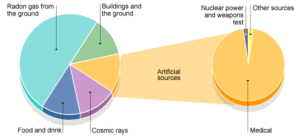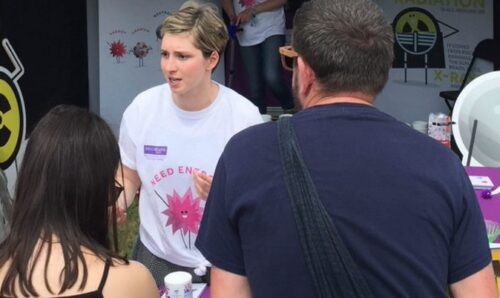Nuclear don’t need no education?
Public engagement 9 October 2014
By Helena S Davies
Science, like countless other specialist subjects and pursuits, is continually guilty of segregating itself into two groups: those that know and everyone else. Now this former group is persistently encouraged and chastised for ensuring that the group consisting of everyone else (otherwise known as the public) are kept informed and are (or at least are given the opportunity to be) educated as to what exactly it is that we know. I say ‘we’ at this point as my job description (and I know many will scoff quite openly at my use of the word ‘job’) is a PhD student of environmental nuclear biology, a description which, funnily enough, is not quickly rolled off the tongue by my grandmother at coffee mornings. I am simply circulated and discussed amongst my family and friends, outside of the science sector, as a nuclear scientist. And there it is; that separation again.
Arguably this is perfectly natural, we categorise people into groups every day of our lives, friends, family, colleagues, celebrities, undergraduates… However, being part of the nuclear sector, I have become increasingly aware of the sheer desperation that this particular industry has in pursuing the breakdown of this separation, because public distrust, with regards to nuclear energy, still lingers and, my word, does this not sit well. Of course there is justifiable reason behind this from the, not so historical, history of the industry (kindly refer to Google for a barrage of examples after typing “nuclear” into the search box where, today only four hits down, a link with the word “bomb” surfaces). Nevertheless this exact topic of public perception of the nuclear industry has come up at every conference, seminar, lecture and outreach programme that I have ever attended. In fact, as soon as I meet someone new and I’m asked about my work, the subject is brought into the fray. The reason I bring this up is because at these events, the most common response and suggested answer to improving the image of nuclear energy amongst the public is (drum roll please and baited breath as I am finally getting to the point of this article): education.
That’s right; apparently you still do not know what nuclear scientists know. However, why should you?! We do not expect and are not expected to know complex human anatomy before going in for surgery. The basics normally suffice for that: cut in the right place and you’ll be OK, cut in the wrong place and you might have some problems. Why isn’t a basic knowledge of the principles and concepts of nuclear energy enough? A basic education of this is certainly provided. Looking at the UK National Curriculum for science released in December 20141 and September 20132 , the principles of nuclear fission and also fusion are listed, in addition to the requirements for every 11- 16 year old residing in England to be taught about the atomic structure and energy sources, both sustainable and non- sustainable. I remember learning this myself 10 years ago, so it isn’t new. It seems wholly unreasonable and unrealistic to suggest that simply battering the public with more facts and figures, jargon busters and media friendly metaphors is the answer. From looking at our school education system alone I would say that actually most people are rather well informed on the subject.

As someone who really enjoys public outreach events and science in general (it’s getting me to shut up about it that’s the trick), I am certainly not saying that this current level of education should stop, nor that continuing to be open and informative about the nuclear industry and radiation in the environment is a bad thing. However, it seems foolish to believe that increasing education will equate to building trust. Science often suffers badly from this, a prime example being the issue with those against vaccinations as well as the respective problems in the nuclear industry. So if more educating is not the best course of action, what is? Improved science journalism? Improved communication skills from the industry? Perhaps toning down the hyper- awareness the nuclear power sector has in trying to alleviate fears and concerns would help? I used the word “desperation” earlier and this is not an emotion people warm to. However, these options will be discussed in more detail in a follow up article (I can tell you are enthralled at the prospect already)…
Kind Regards from just another brick in the wall.
Helena
1Department of Education. Science Programmes of study: key stage 4. National curriculum in England. December 2014. https://www.gov.uk/government/publications/national-curriculum-in-england-science-programmes-of-study
2Department of Education. Science Programmes of study: key stage 3. National curriculum in England. September 2013. https://www.gov.uk/government/publications/national-curriculum-in-england-science-programmes-of-study
This article has been migrated





Great article Helena. Looking forward to the next…
I do think however, that whilst your analogy of surgery is totally valid, I do feel “the public” should know about nuclear energy. I believe this because so many people actually have an “education” on the subject but I find, more often than not, that a lot of what is discussed is factually incorrect. So I really hope that we as scientists can continue to tell the world about these things because education is so important.
I think at the end, you raise a far more valid question, how do we provide more of an education? That for me is the problem, how to communicate this information at the correct level that people will positively respond to…
Great article.
The nuclear education over in Scotland is atrocious. Just today I had to sit through over an hour of my lecturer (im not sure he is qualified) in thermodynamics rant for ages about how it was his opinion nuclear power is a terrible thing and a step backwards. Literally non stop and didn’t to the actual teaching material till much later. It was insane. And this is in the final year of a Mechanical Engineering degree. He was even talking about conspiracy theories about the US government and a tonne of other sh*t. We are taught about nuclear power in Physics, but thats it ,and the general opinion on Scotland is a lot different to the rUK. Some people have really acidic opinions and you can see their tongue twist as they talk about all the horrors and horrors of nuclear. Like its some evil anti jesus technology.
I wonder if part of the nuclear industry’s problem is that it can sometimes be seen to ‘try too hard’? There is an air of mistrust around the whole topic of nuclear, which can sometimes be exasurbated by constantly having ‘scientists’ telling ‘the public’ that everything’s fine and trying to over explain what’s really going on?
I also, see your point about not knowing the finer details of surgery, but the nuclear industry faces an extra difficulty in that most industries/scientific areas don’t get quite as much bad press. If you were to google how a certain operation is carried out you are probably going to find an NHS page which is something you know to trust. If you were to google ‘nuclear’ as you’ve already pointed out it isn’t long before you get to the word ‘bomb’ and there isn’t really a generally accepted trustable site you can go to
Great article Helena-definitely made me think!
Hmm. Education is one thing. The ‘nuclear industry’ for the want of a better term, needs to earn the trust of the population in general. Consider aviation. A lot of people know as little about how an aeroplane works as they do about how a nuclear power station works – yet they’re quite happy to climb into a big metal tube once or twice a year to be hurtled through the freezing tropopause somewhere close to the speed of sound. Just to go to the beach. In general (except for the few with the “I don’t like flying” phobia) we’re all quite happy. Why is this? Extensive knowledge of gas turbine technology and Bernoulli’s theorem? Possibly not…
The aviation industry spends a lot of time talking safety, and making stats about measurable safety not just available but promoted – especially at times of stress – e.g. when accidents happen. the Causes of accidents are also talked about – a lot. Not just in the immediate aftermath of a disaster (when speculation is rife) but after the investigation when the facts are known (they do extremely thorough investigations too, and publish the reports). The big thing is to communicate – balanced communication where mistakes are acknowledged, corrections and fixes discussed, regulations updated, as well as good news shared. It’s all so much more ‘public’ than what’s out there on Nuclear, which still has a legacy of secrecy, probably as a result of the dreaded ‘bomb’ word. And they romanticise their heritage, in the stories that are told.
The Cosmologists have Dr Hawking, and Brian Cox (and even Dara O’Briain). The Aviators glorify their heroes, from the earliest pioneers (Wright Bros, Amelia Earhart, Lindberg, etc.) to the test pilots (Yeager, Derry), space men (Armstrong, Buzz Aldrin, Chris Hadfield, Tim Peake), and story tellers (Antoine de Saint-Exupéry, Richard Bach), and even make celebrities out of their aeroplanes (Vulcan XH558 – the people’s plane, spirit of Great Britain etc.)
So dear Nuclearists, get your message out there! De-mystify your subject by talking about the wonders of your science in a way that can get airplay on the One Show. Far more useful than adding to the national curriculum.